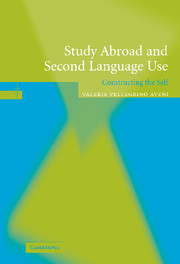Book contents
- Frontmatter
- Contents
- Acknowledgments
- Note on text conventions
- Abbreviations
- Introduction
- 1 Language use in a social context
- 2 The social dance: second language use and the construction of self
- 3 Learners and their environment: factors affecting self-construction
- 4 Coming into our own: the convergence of real self and ideal self
- Conclusion: The self in the second language: implications and next steps
- Appendix 1 Study context and research methodology
- Appendix 2 ACTR study-abroad program participants: 1995–1996 demographic profile
- Appendix 3 Participant profiles
- References
- Index
Conclusion: The self in the second language: implications and next steps
Published online by Cambridge University Press: 06 January 2010
- Frontmatter
- Contents
- Acknowledgments
- Note on text conventions
- Abbreviations
- Introduction
- 1 Language use in a social context
- 2 The social dance: second language use and the construction of self
- 3 Learners and their environment: factors affecting self-construction
- 4 Coming into our own: the convergence of real self and ideal self
- Conclusion: The self in the second language: implications and next steps
- Appendix 1 Study context and research methodology
- Appendix 2 ACTR study-abroad program participants: 1995–1996 demographic profile
- Appendix 3 Participant profiles
- References
- Index
Summary
Language not only represents but also can be viewed as playing a significant role in the construction of reality … To this extent, focus shifts to examine ways speakers, in using particular linguistic devices, are simultaneously positioning themselves and others in discourse, thereby making salient particular views of self and others.
Nancy Budwig 2000 (197)I've realized that you don't learn a language by just sitting in class or coming to Russia. You have to make mistakes and take the consequences or whatever, but at least I have to just practice, practice, practice, and don't let your pride get the better of you. I didn't think about it, even at orientation, but now I know intimidation is a big block in language acquisition.
Abe, Spring SemesterFor Abe, as for other students, the ultimate reward of study abroad is not better language, deeper understanding of the foreign culture, or even the friends you make or the memories you take along. Pride, intimidation, mistakes, and consequences – for Abe, the real return is the knowledge that these common obstacles to language use, ones that previously remained concealed to him, were only paper dragons, easily blown away with a greater sense of the self. Abe's new-found knowledge of who he is and what he is capable of achieving ensure for him continued foreign language use and development. Undoubtedly, Abe's language skills have improved and he has acculturated in ways that allow him to understand the Russian people and their society like never before.
- Type
- Chapter
- Information
- Study Abroad and Second Language UseConstructing the Self, pp. 144 - 150Publisher: Cambridge University PressPrint publication year: 2005



